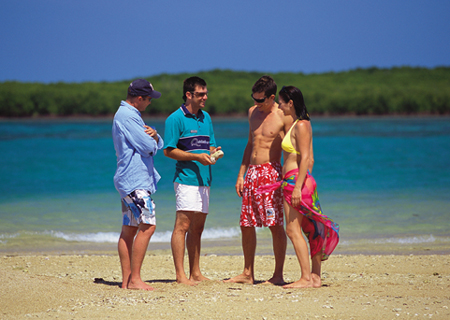Reef Biosearch, the environmental division of the Quicksilver Group, was founded in March 1986 – in an era before the term “ecotourism” was even spawned.
Originally the brainchild of marine biologist Wendy Morris, Reef Biosearch’s aim from day one has been to combine tourism, education and research. In the early days, this was by way of providing an educational slideshow to passengers and chatting to them about the reef. All these years later our guiding philosophy still remains the same; environmental awareness and conservation starts with education. Today, Reef Biosearch continues to contributes to vital and ongoing Reef research and with a team of up to 10 fully qualified marine biologists, is dedicated to turning the ocean into a classroom and educating guests about this magnificent watery wonderland.
Significantly, Reef Biosearch has the longest logbook database of marine observations on the Great Barrier Reef, ongoing for nearly three decades. This information allows scientists to observe trends and changes in the marine environment and to allow the Quicksilver Group to manage our site usage to preserve our environment. This database has evolved into the GBRMPA’s (Great Barrier Reef Marine Park Authority) program “Eye on the Reef”, which has been embraced by the region’s marine operators.
Over the years, Reef Biosearch has been involved in many noteworthy research projects including:
- Collaborative innovative research project with UQ aimed at developing mitigation measures to prevent coral bleaching such as the coral shading and sprinkler project.
- The first to research the distribution and abundance of a previously undescribed species of marine algae (now known as Chrysocystis fragilis). At the time, this algae had not been observed to occur on the Great Barrier Reef. The motivation of this research was to ensure that its presence was not directly the result of the marine tourism industry.
- The first detailed environmental monitoring program on coral reefs associated with marine tourism, in particular the effects of a man made structure on the reef. This was done prior to such studies being a permit requirement of GBRMPA, the federal regulatory body, when issuing permits for reef tourism operations.
- The first permitted coral transplantation project to help heal small discrete patches of coral at a site degraded by a COTS (Crown of Thorns Starfish) outbreak in the late 1990s.
- Sampling program to investigate the presence of offshore marine stingers 10-12 days after the full moon on the outer reef. This has led to the discovery of several new species. We continue ongoing research on seasonal patterns of Jellyfish.
- Cross shelf water monitoring project in conjunction with UQ (University of Queensland).
- A project in conjunction with JCU (James Cook University – Townsville) to investigate the sudden widespread mortality of giant clams in the local area (and the subsequent transplantation of giant clams from a mariculture project at Orpheus Island to restock affected areas).
As well as these projects, Reef Biosearch acts as an environmental watchdog for Quicksilver ensuring sustainability. This involves investigating the environmental qualities of certain products, assisting in reducing waste, conducting internal environmental audits and ensuring best practices.
With our focus on education we participate at all levels within our community.
- We implemented a marine studies unit in the local school curriculum. Quicksilver also offers every year 7 student in the local area the chance to travel to Low Isles with their school.
- Our marine biologists provide talks to local primary and secondary schools about reef issues, as well provide consultation and advisory roles with tertiary and government stakeholder bodies.
- We liaise with local schools to become involved with the GBRMPA’s Reef Guardians program.
- Ongoing relationships with universities, such as Flinders University, to provide intern positions.
Since Reef Biosearch started, more than 70 marine biologists have worked with the company providing a firm foundation to career opportunities and development in the broader community and ensuring our premise of environmental education, conservation and preservation is continued.


